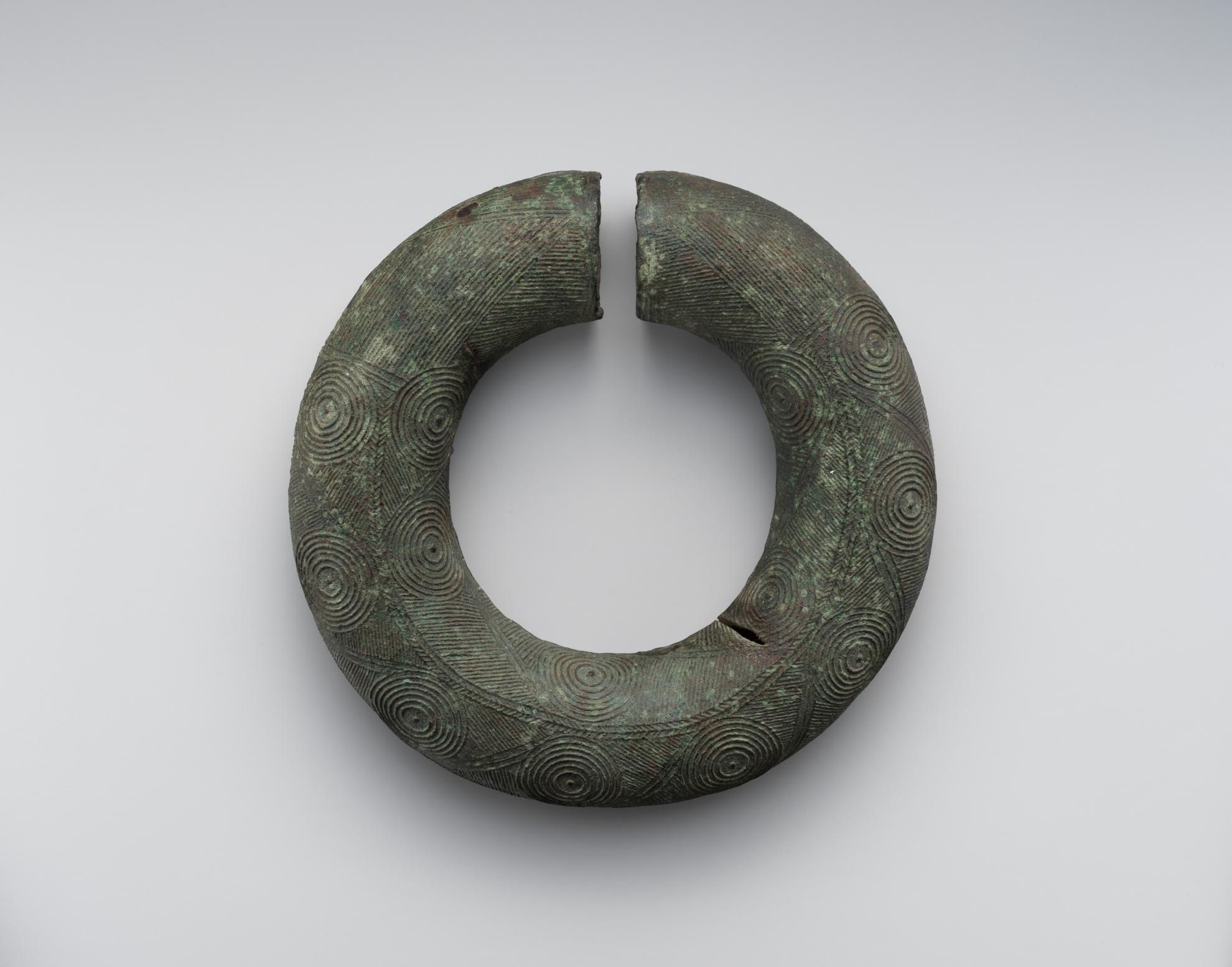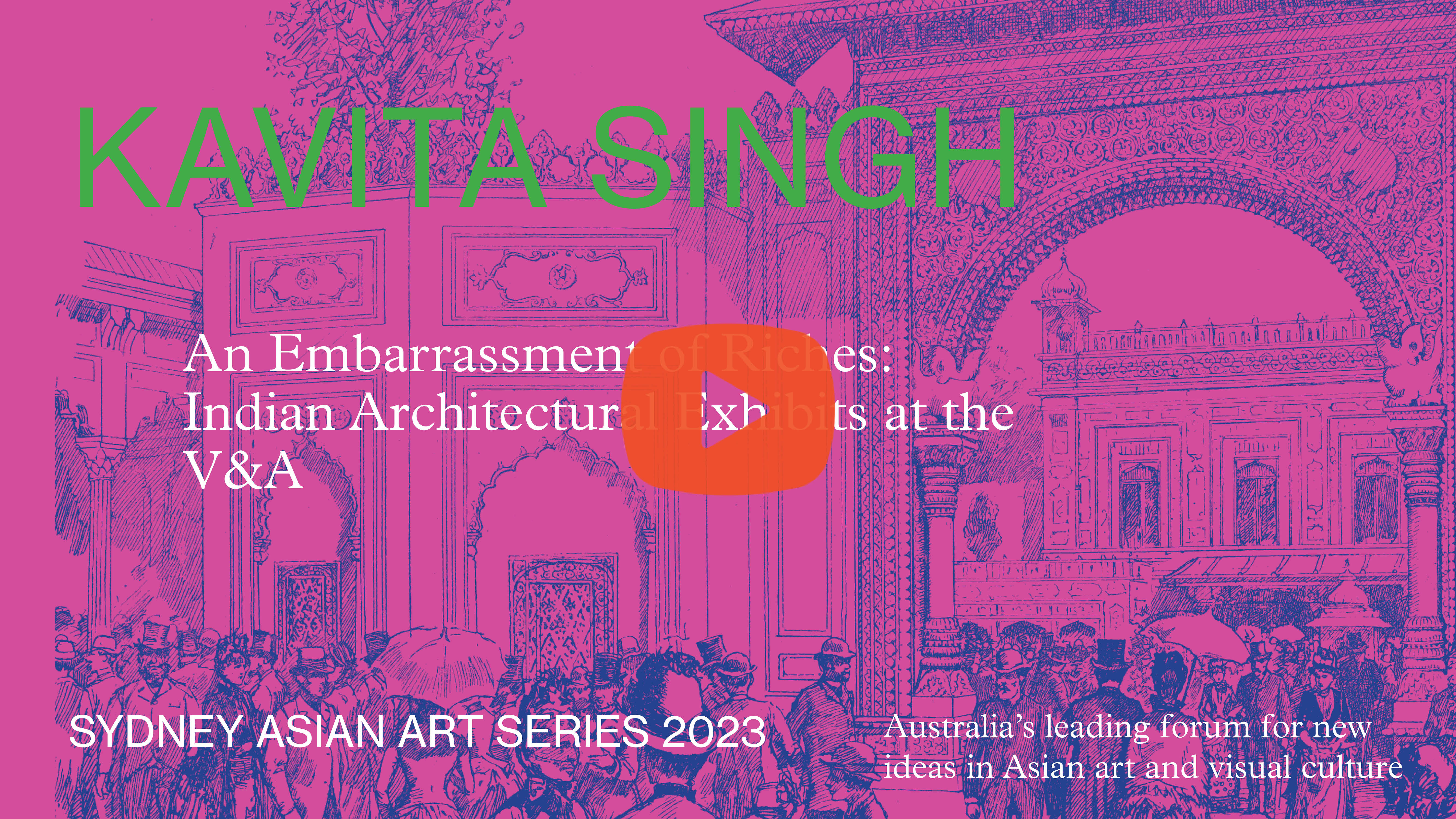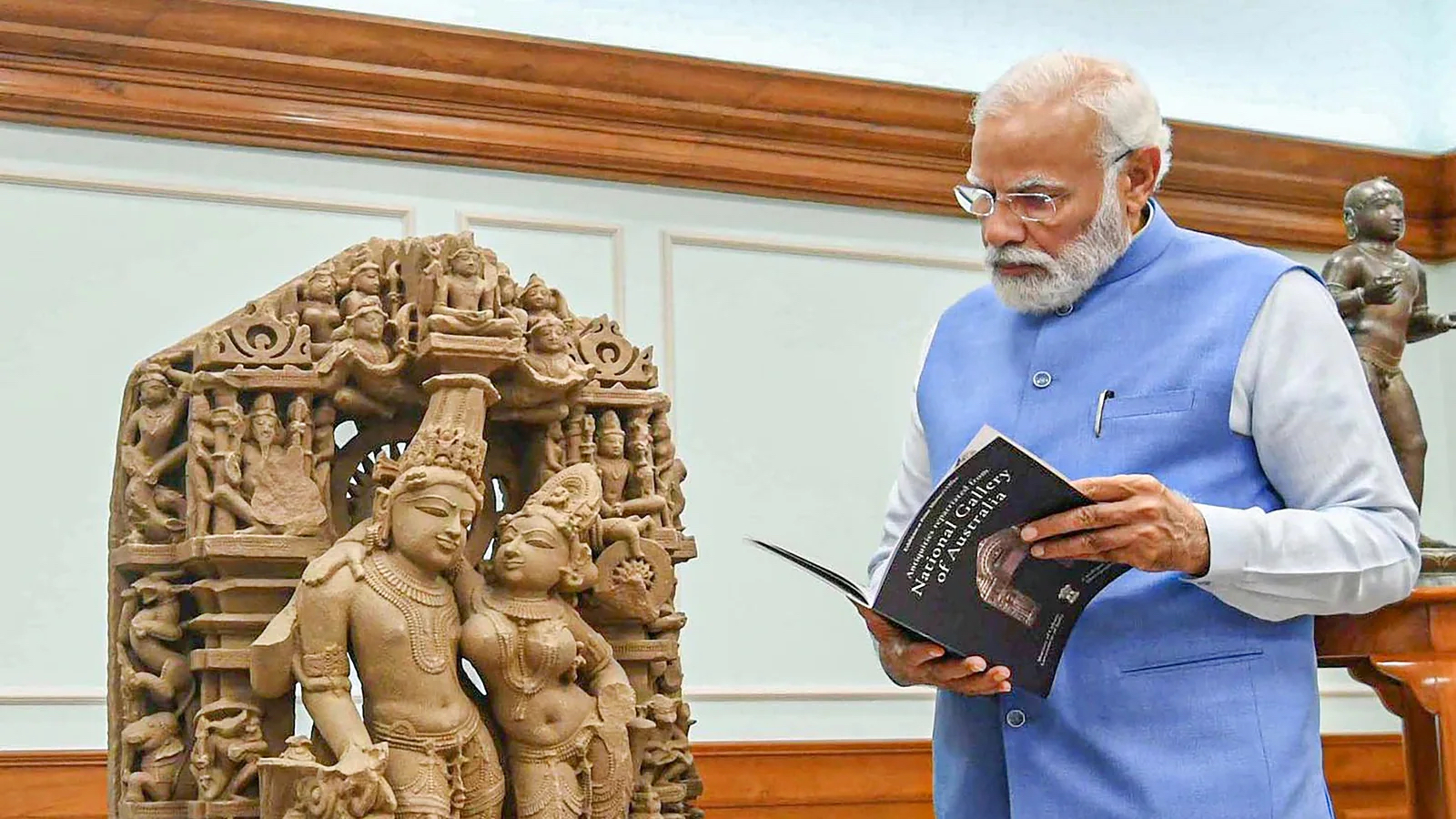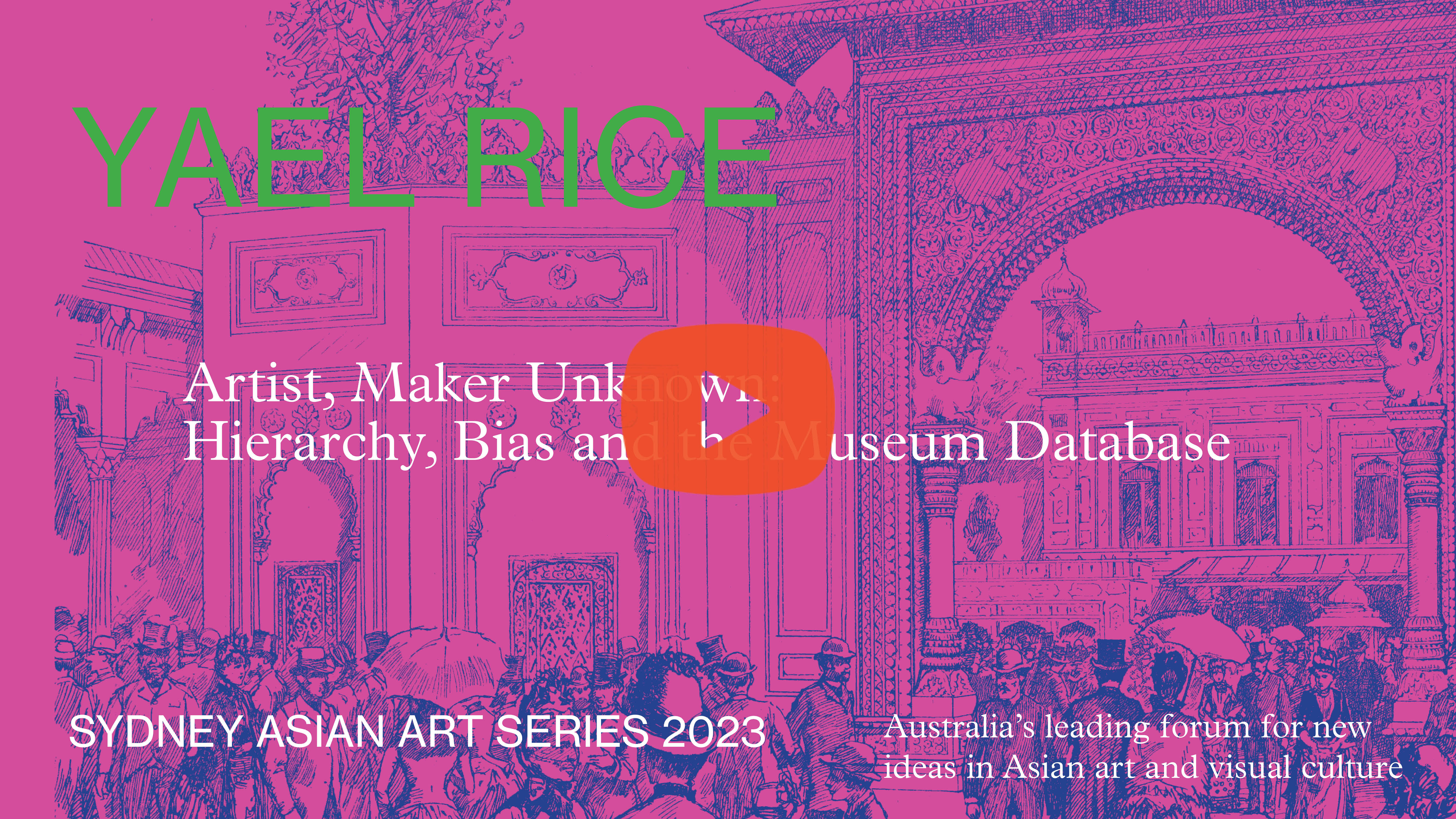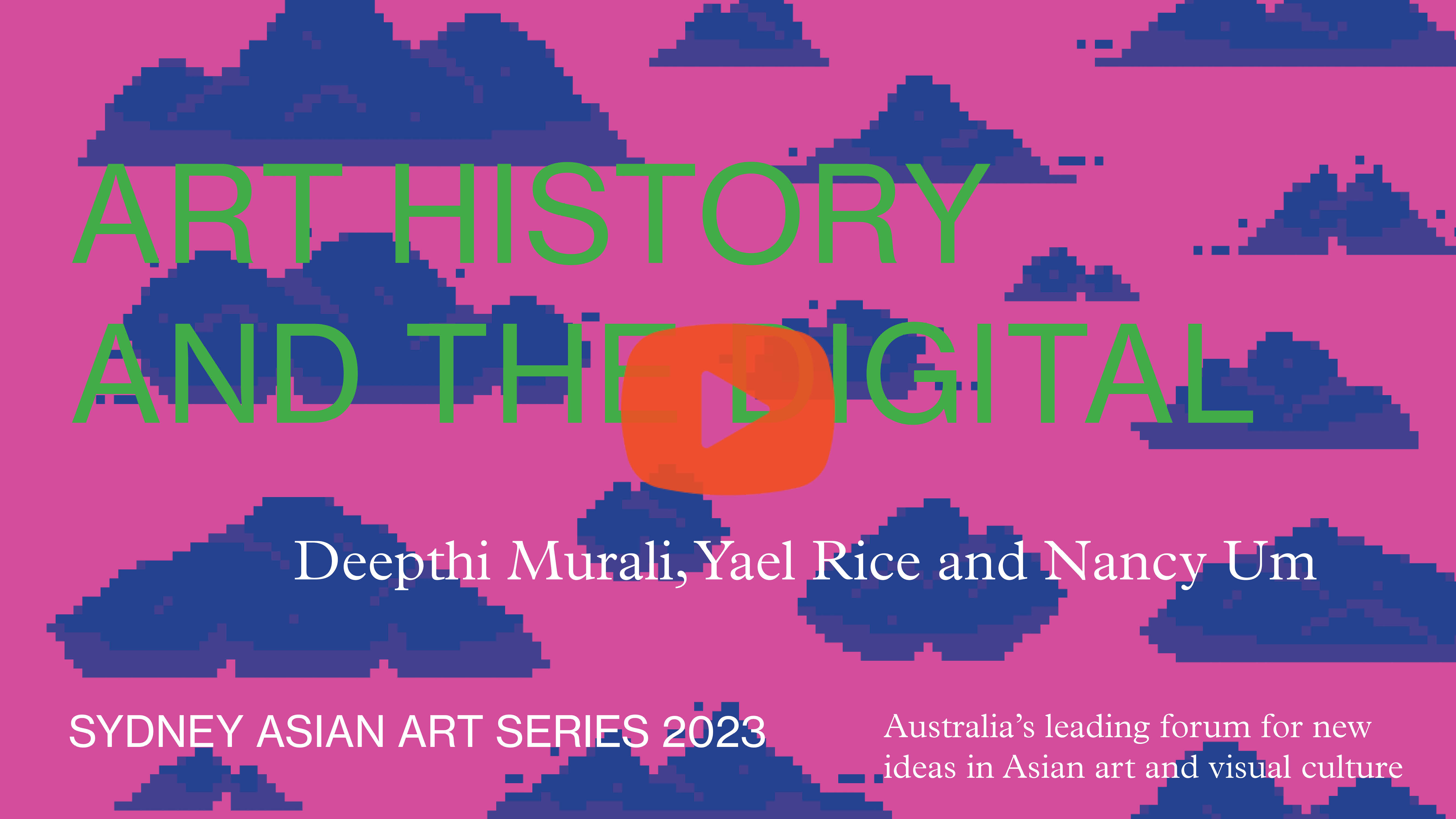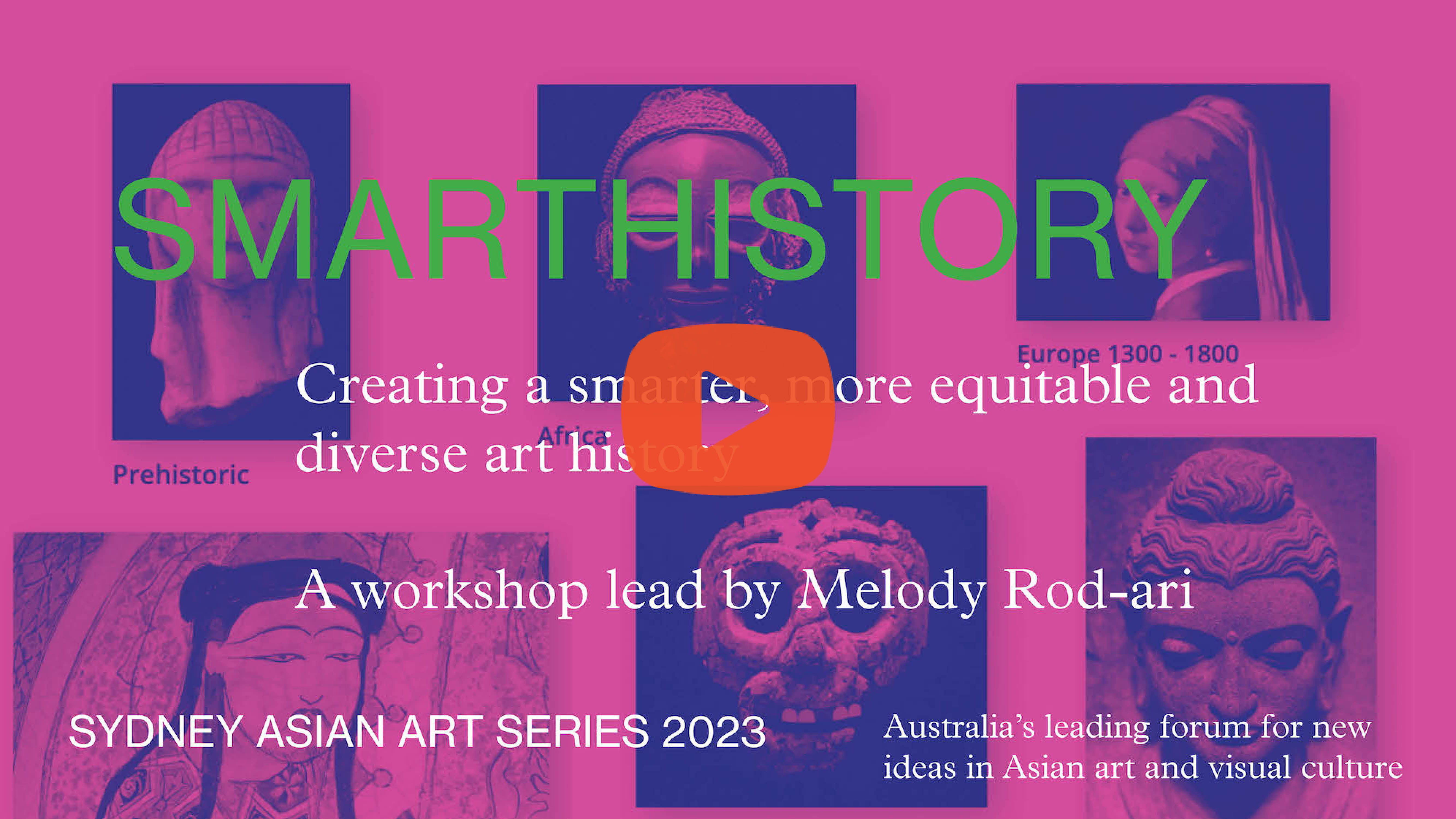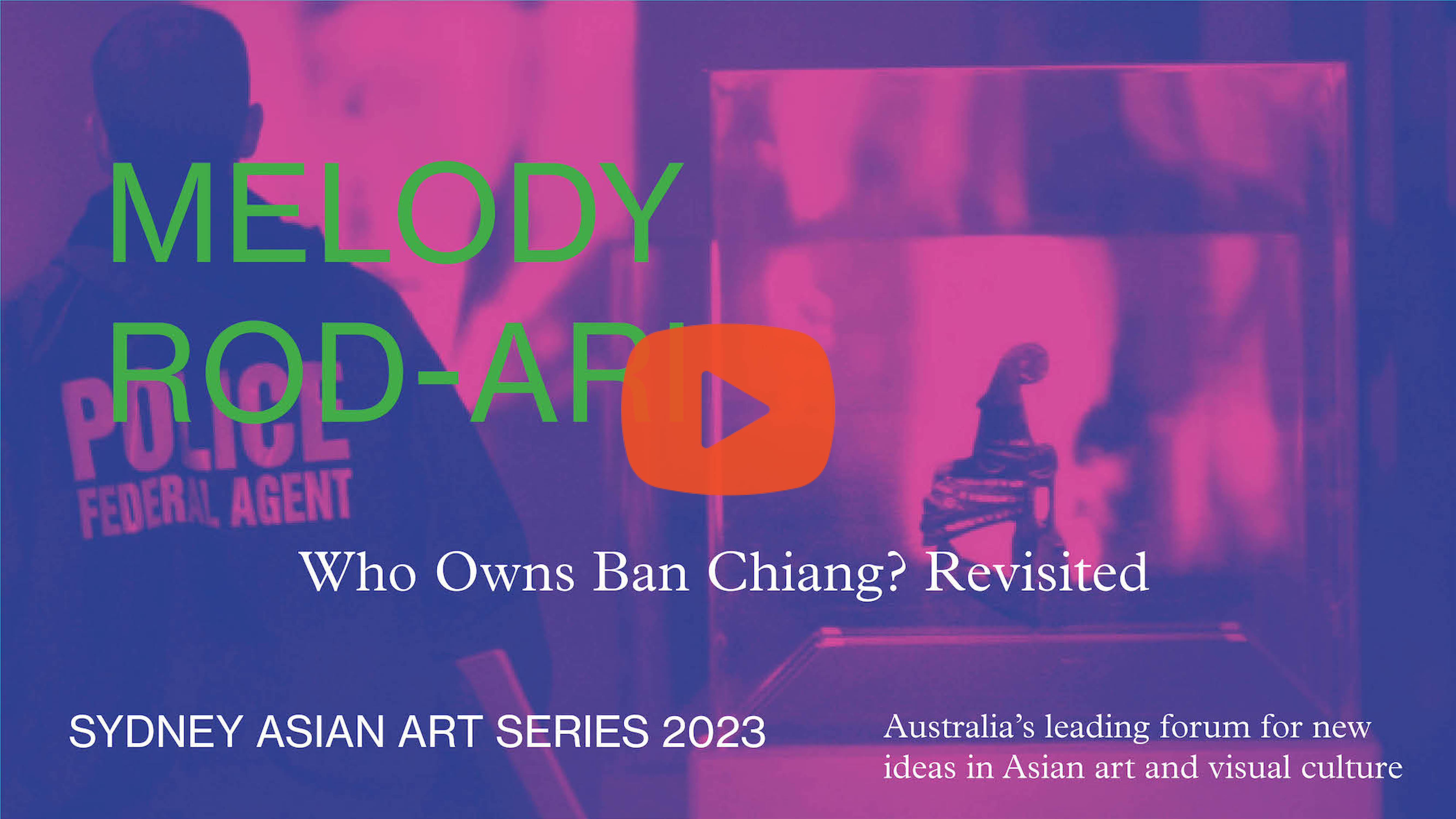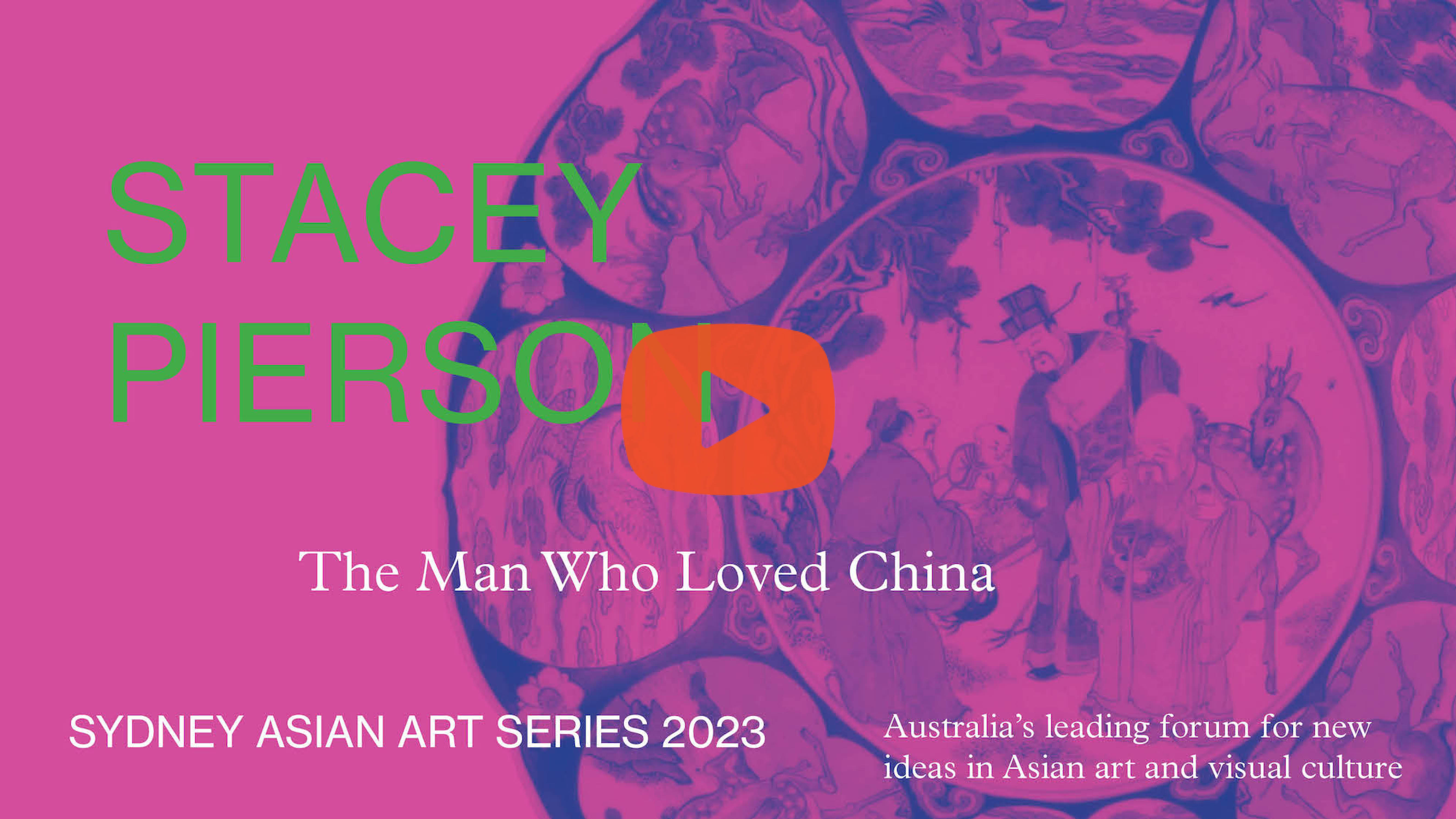Sydney Asian Art Series 2023
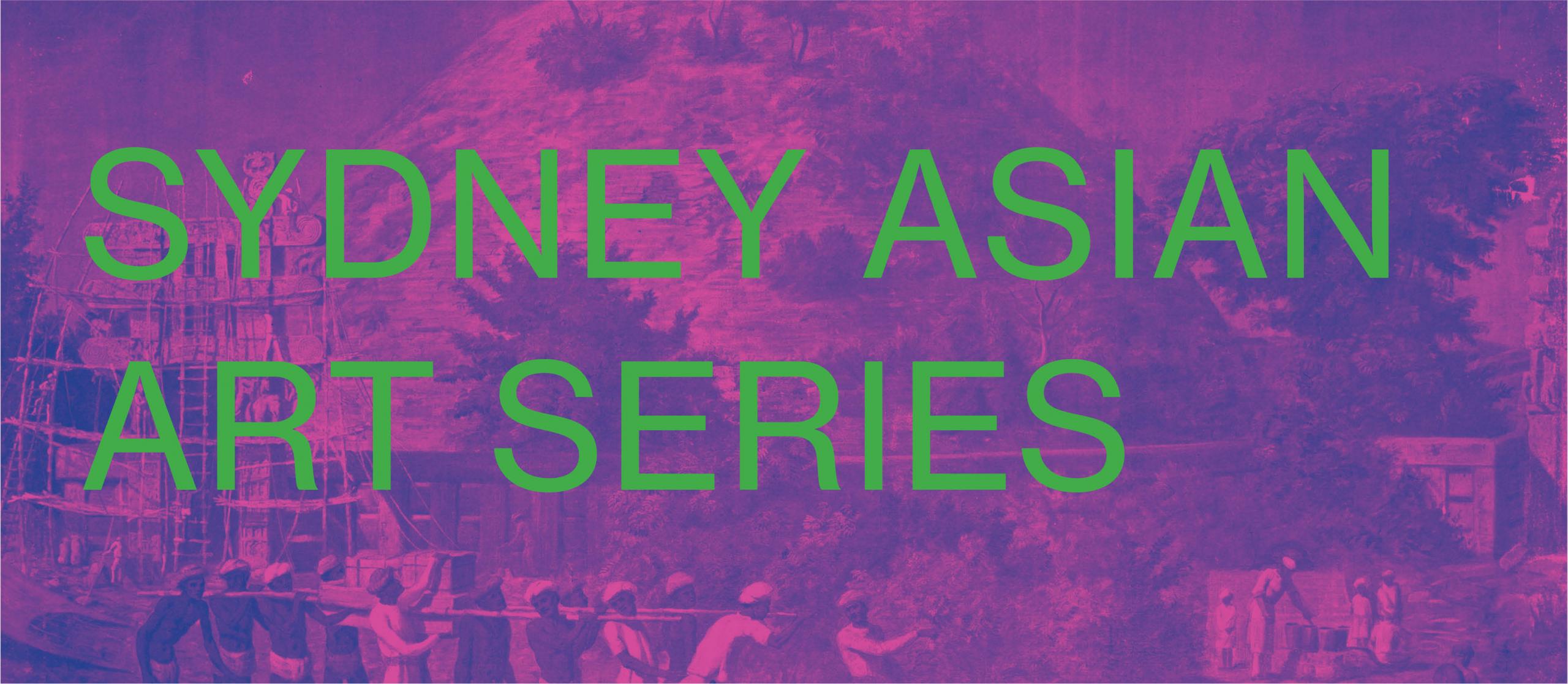
A series bringing together researchers from across the world to share their work on critical issues in early, modern and contemporary Asian art.
In 2023, the series focus is on collection, as part of a broader three-year investigation entitled "Cura".
Each year, the Sydney Asian Art Series gathers leading international voices on critical issues in early, modern and contemporary Asian art.
Inaugurating a new three-year research agenda entitled "Cūra", the 2023 series will focus on the topic of "Collection". The series will include public programs by scholars Kavita Singh, Yael Rice and Stacey Pierson, and by Scholar in Residency Melody Rod-ari.
Convened by Olivier Krischer with co-convenor Alex Burchmore, and co-presented by the Power Institute and VisAsia at the Art Gallery of NSW.
Explore past Sydney Asian Art Series
SAAS 2023-25: Cūra
From 2023 to 2025 the series will pursue an ambitious new research agenda, entitled “Cūra: Collection, Community, Care”. Over three years, the series will gather together leading scholars on collecting histories, object provenance, shifting notions of custodianship, and the role of researchers and curators as agents of care for artworks and their communities.
It is often noted that at the root of the English term “curatorship” is “cūra”, the Latin word meaning “care”. Less often remarked, however, is the term’s etymological link to the goddess Cūra, said to have fashioned the first human from clay.
This double meaning of cūra, as both practice of care and object of devotion, underpins not just the practice of curating, but also the entire apparatus of Euro-American practices and institutions that produce culture in modernity. Indeed, for the modern German philosopher Martin Heidegger, cūra was akin to what he called “being-in-the-world”.
This series asks: How have these practices of cūra shaped Asian art history? And what alternative practices and institutions of collecting, community and care might exist?
The 2023 series will begin this investigation with a focus on “collection”, lead by convenor Dr Olivier Krischer with co-convenor Dr Alex Burchmore. In 2024, the series will focus on “community” (with co-convenor Dr Yvonne Low), considering modes of curating, sharing and engagement, while in 2025, we will explore “care” (with co-convenor Dr Peyvand Firouzeh), delving into shifting understandings of conservation and custodianship, as well as our very notions of art and its authors.
Scholar in Residence
A key component of the 2023-25 Cura research agenda is a new scholar in residence program. Each year the Series will bring an international guest to Sydney for a three to four week stay, during which time they will deliver public events, meet students and staff at the University and Art Gallery of NSW, and have the opportunity to conduct archival research in the collections of both institutions.
The inaugural Scholar in Residence for 2023 is Melody Rod-ari. Learn more about Melody's work here.
Events
Past
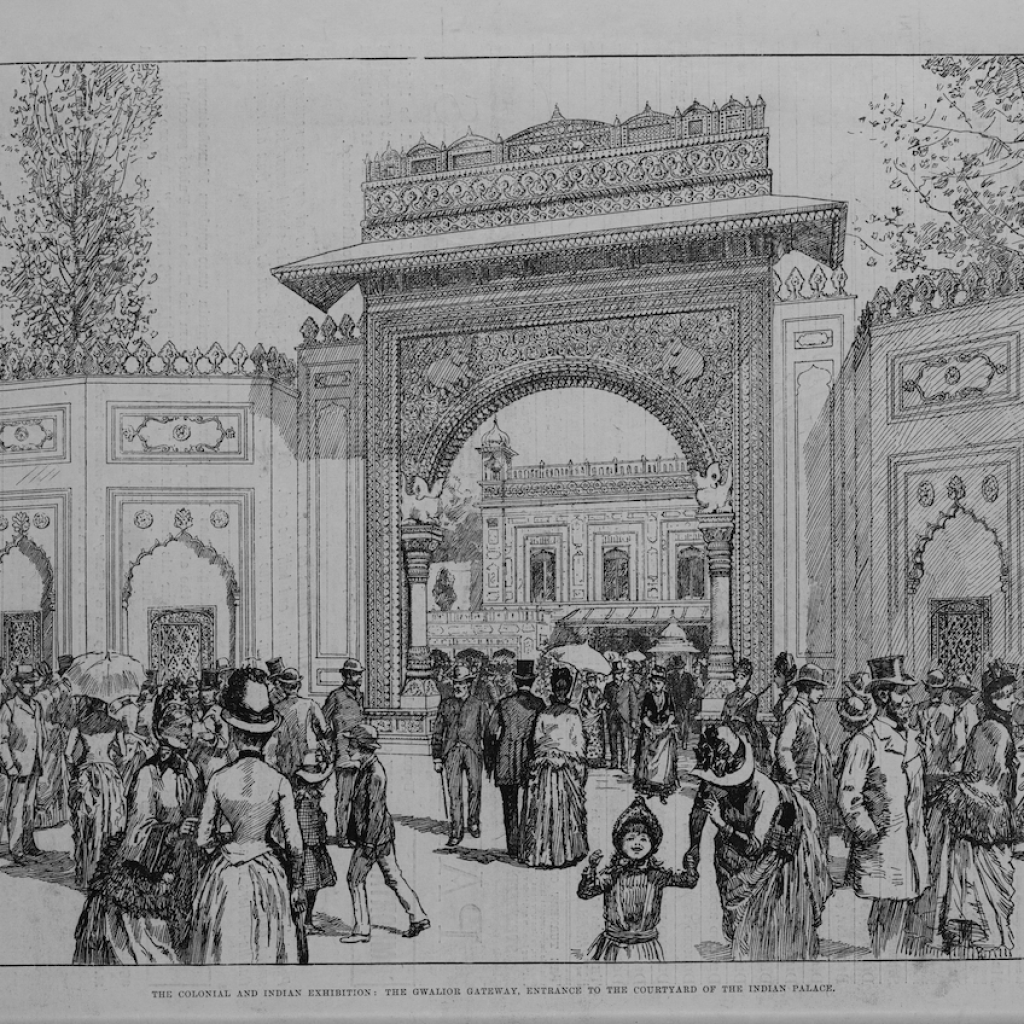
An Embarrassment of Riches: Indian Architectural Exhibits at the V&A
A lecture on the hidden histories of museums.
People
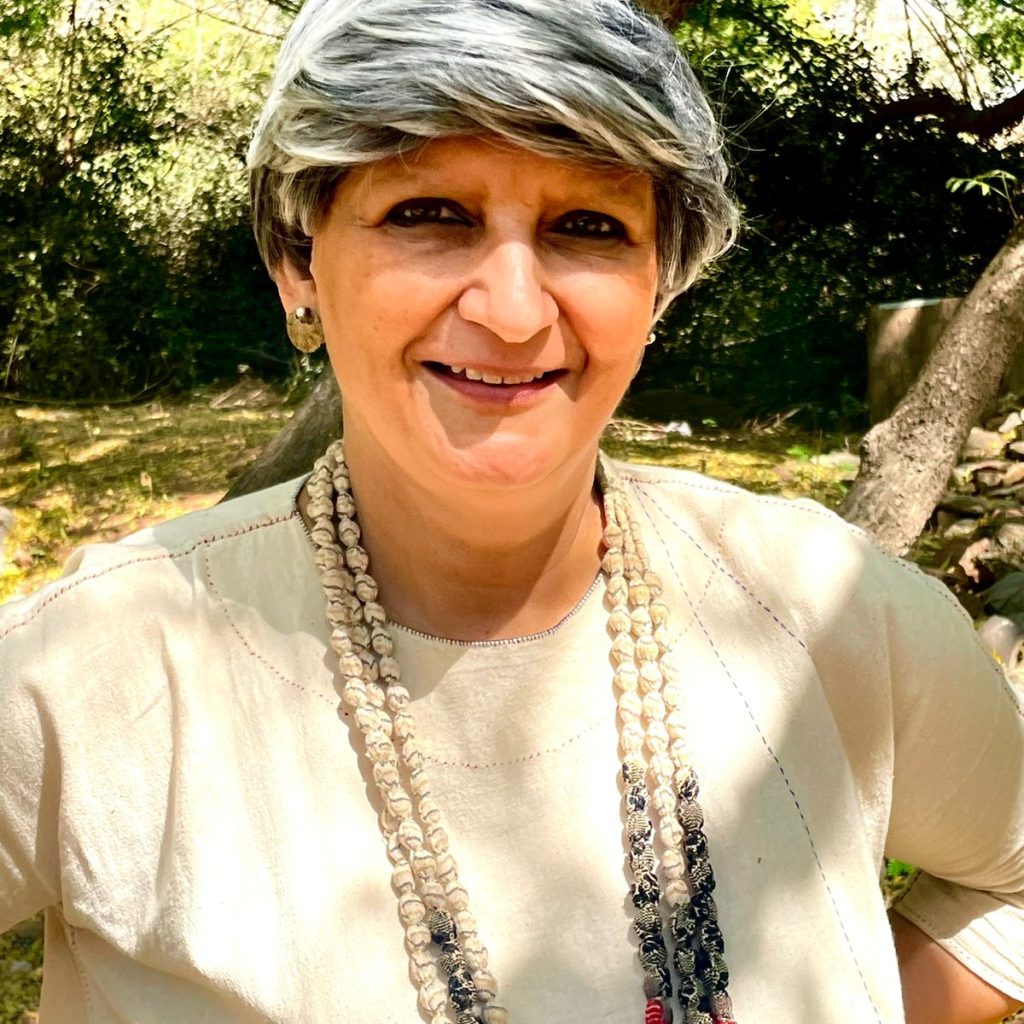
Kavita Singh
Kavita Singh is an art historian based in New Delhi, who works on the history of Indian painting, and the history and politics of museums. Formerly Professor and Dean at the School of Arts and Aesthetics, Jawaharlal Nehru University, she has published essays on issues of colonial history, repatriation, secularism and religiosity, fraught national identities, and the memorialization of difficult histories as they relate to museums in South Asia and beyond. She has also published widely on Mughal painting, exploring style as a visual language self-consciously used by artists as a vehicle of meaning. She is the editor and author of numerous acclaimed books, including: No Touching, No Spitting, No Praying: The Museum in South Asia (co-edited with Saloni Mathur, Routledge, 2014), Museums, Heritage, Culture: Into the Conflict Zone (2015), Real Birds in Imagined Gardens: Mughal Painting Between Persia and Europe (2016), Museum Storage and Meaning: Tales from the Crypt (co-edited with Mirjam Brusius, 2017) and Scent Upon a Southern Breeze: The Synaesthetic Arts of the Deccan (2018). Singh was awarded the Infosys Prize for the Humanities in 2018 and was elected to the American Academy of Arts and Sciences in 2020.
A workshop unpacking the current discourse around repatriation, and the complex politics that underpin it.
People

Kavita Singh
Kavita Singh is an art historian based in New Delhi, who works on the history of Indian painting, and the history and politics of museums. Formerly Professor and Dean at the School of Arts and Aesthetics, Jawaharlal Nehru University, she has published essays on issues of colonial history, repatriation, secularism and religiosity, fraught national identities, and the memorialization of difficult histories as they relate to museums in South Asia and beyond. She has also published widely on Mughal painting, exploring style as a visual language self-consciously used by artists as a vehicle of meaning. She is the editor and author of numerous acclaimed books, including: No Touching, No Spitting, No Praying: The Museum in South Asia (co-edited with Saloni Mathur, Routledge, 2014), Museums, Heritage, Culture: Into the Conflict Zone (2015), Real Birds in Imagined Gardens: Mughal Painting Between Persia and Europe (2016), Museum Storage and Meaning: Tales from the Crypt (co-edited with Mirjam Brusius, 2017) and Scent Upon a Southern Breeze: The Synaesthetic Arts of the Deccan (2018). Singh was awarded the Infosys Prize for the Humanities in 2018 and was elected to the American Academy of Arts and Sciences in 2020.
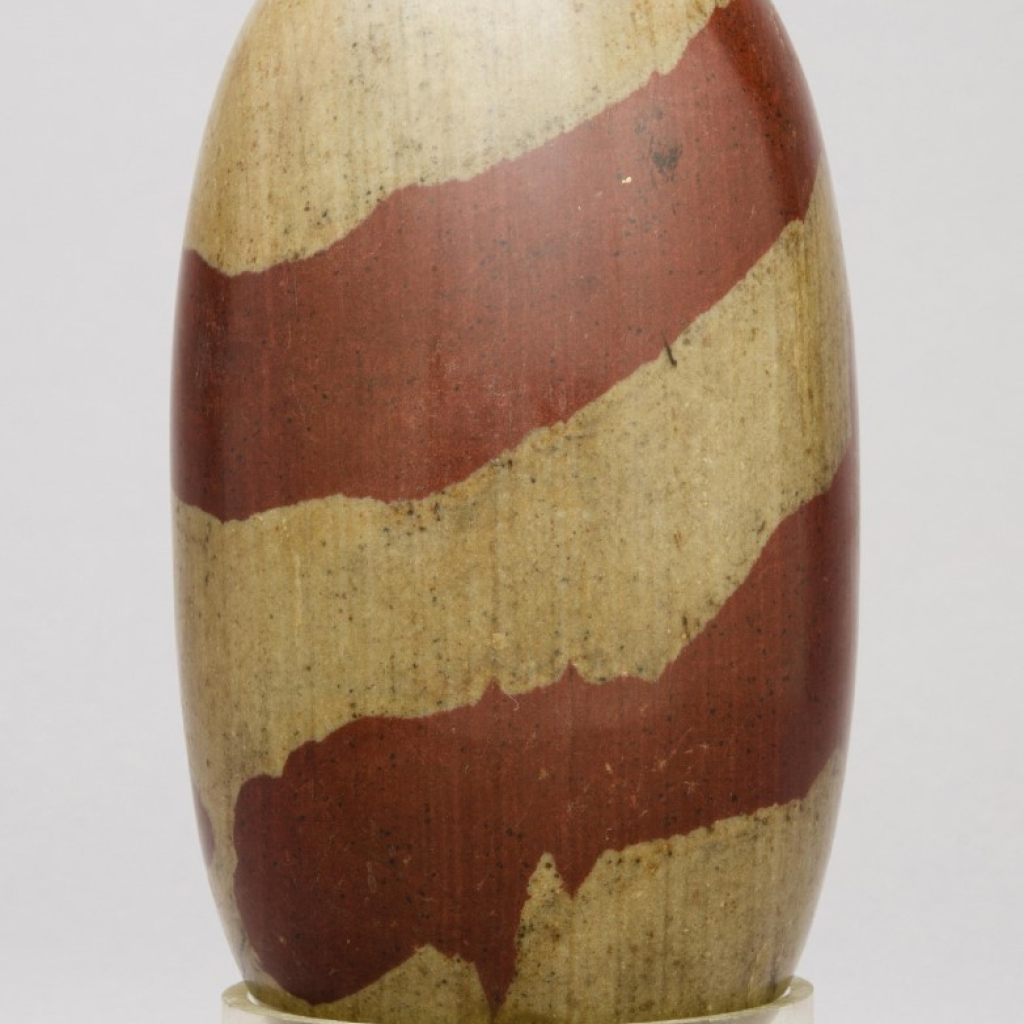
Artist/Maker Unknown: Hierarchy, Bias, and the Museum Database
A lecture on the hierarchies underpinning museums new data systems.
People
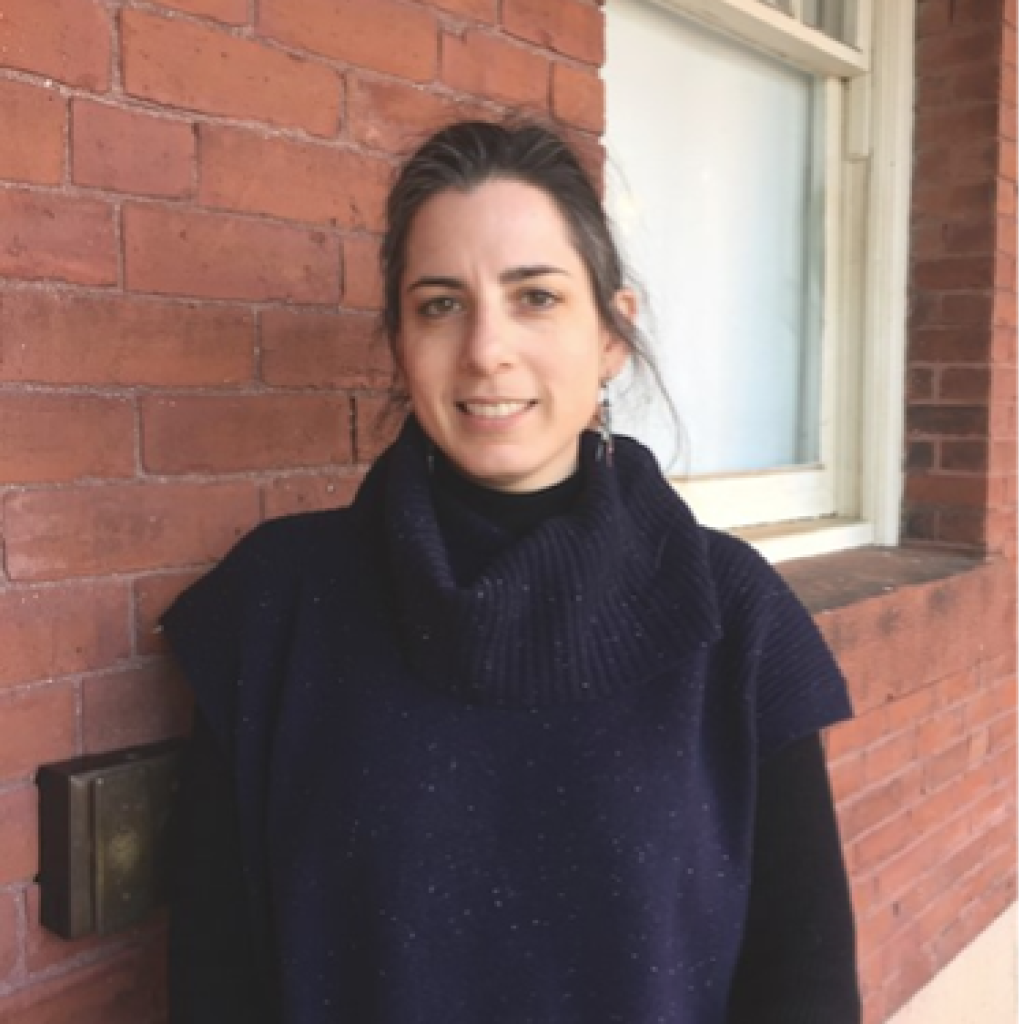
Yael Rice
Yael Rice is associate professor of art history and Asian languages and civilizations at Amherst College, Massachusetts. She specializes in the art and architecture of South Asia, Central Asia, and Iran, with a particular focus on manuscripts and other portable arts of the fifteenth through eighteenth centuries. Between 2009-12, she held the position of Assistant Curator of Indian and Himalayan Art at the Philadelphia Museum of Art. Recent publications include “Art History Beyond Objects” (Art Journal Open, published 26 January 2023), on the importance of centering critical digital methods and tools in the teaching of collections-based art history courses; and, with Stephennie Mulder, “The Mystery of the Timurid Qur’an” (Prospect Magazine, published online July 22, 2020), on the commercial sale of Islamic manuscripts lacking any publicly-stated authenticating provenance. She is the author of the forthcoming book The Brush of Insight: Artists and Agency at the Mughal Court (University of Washington Press, 2023).
Art History and the Digital: A Conversation with Yael Rice, Nancy Um, Deepthi Murali and Priya Jaradi
A panel conversation on the implications of the digital on art history practice and pedagogy.
People

Yael Rice
Yael Rice is associate professor of art history and Asian languages and civilizations at Amherst College, Massachusetts. She specializes in the art and architecture of South Asia, Central Asia, and Iran, with a particular focus on manuscripts and other portable arts of the fifteenth through eighteenth centuries. Between 2009-12, she held the position of Assistant Curator of Indian and Himalayan Art at the Philadelphia Museum of Art. Recent publications include “Art History Beyond Objects” (Art Journal Open, published 26 January 2023), on the importance of centering critical digital methods and tools in the teaching of collections-based art history courses; and, with Stephennie Mulder, “The Mystery of the Timurid Qur’an” (Prospect Magazine, published online July 22, 2020), on the commercial sale of Islamic manuscripts lacking any publicly-stated authenticating provenance. She is the author of the forthcoming book The Brush of Insight: Artists and Agency at the Mughal Court (University of Washington Press, 2023).
Nancy Um
Nancy Um is professor in the department of art history at Binghamton University. She received her PhD in art history from UCLA in 2001. Her research explores the Islamic world from the perspective of the coast, with a focus on material, visual, and built culture on the Arabian Peninsula and around the rims of the Red Sea and Indian Ocean. Her book The Merchant Houses of Mocha: Trade and Architecture in an Indian Ocean Port(University of Washington Press, 2009) relies upon a cross-section of visual, architectural, and textual sources to present the early modern coastal city of Mocha as a space that was nested within wider world networks, structured to communicate with far-flung ports and cities across a vast matrix of exchange. Her recent book, Shipped but not Sold: Material Culture and the Social Order of Trade during Yemen’s Age of Coffee(University of Hawai’i Press, 2017), explores the material practices and informal social protocols that undergirded the overseas trade in 18thC Yemen. Her articles have appeared in the Journal of the Society of Architectural Historians, African Arts, Northeast African Studies, Journal of Early Modern History, Genre: Forms of Discourse and Culture, Art History, and Getty Research Journal. She has received research fellowships from the Fulbright program, the National Endowment for the Humanities, the Getty Foundation, and the American Institute for Yemeni Studies.
Deepthi Murali
Deepthi Murali is a Research Assistant Professor at the Roy Rosenzweig Center for History and New Media (RRCHNM) at George Mason University. She is an art historian of South Asia with a focus on decorative arts of eighteenth- and nineteenth-century South India. Her research examines networked histories of production, circulation, and use of wood and ivory objects from southwestern India and cotton textiles from southeastern India, globally. At RRCHNM, Deepthi manages digital public humanities projects and carries out digital art historical research for three projects: she is co-PI on Connecting Threads, a born-digital project exploring the history of striped and checked Indian cotton textiles and their use by free and enslaved black communities in the Greater Caribbean Region. Her other digital art history project focuses on the history of eighteenth-century chintz textiles from India, using textiles metadata from museums to explore what digital humanities methodologies can bring to the discipline. Deepthi is also the project director for the HBCU History and Culture Access Consortium, a digital public history project led by The Smithsonian National Museum of African American History and Culture. Her research and projects have been funded by National Endowment for the Humanities, Arts and Humanities Research Council, Andrew W. Mellon Foundation, and American Institute of Indian Studies.
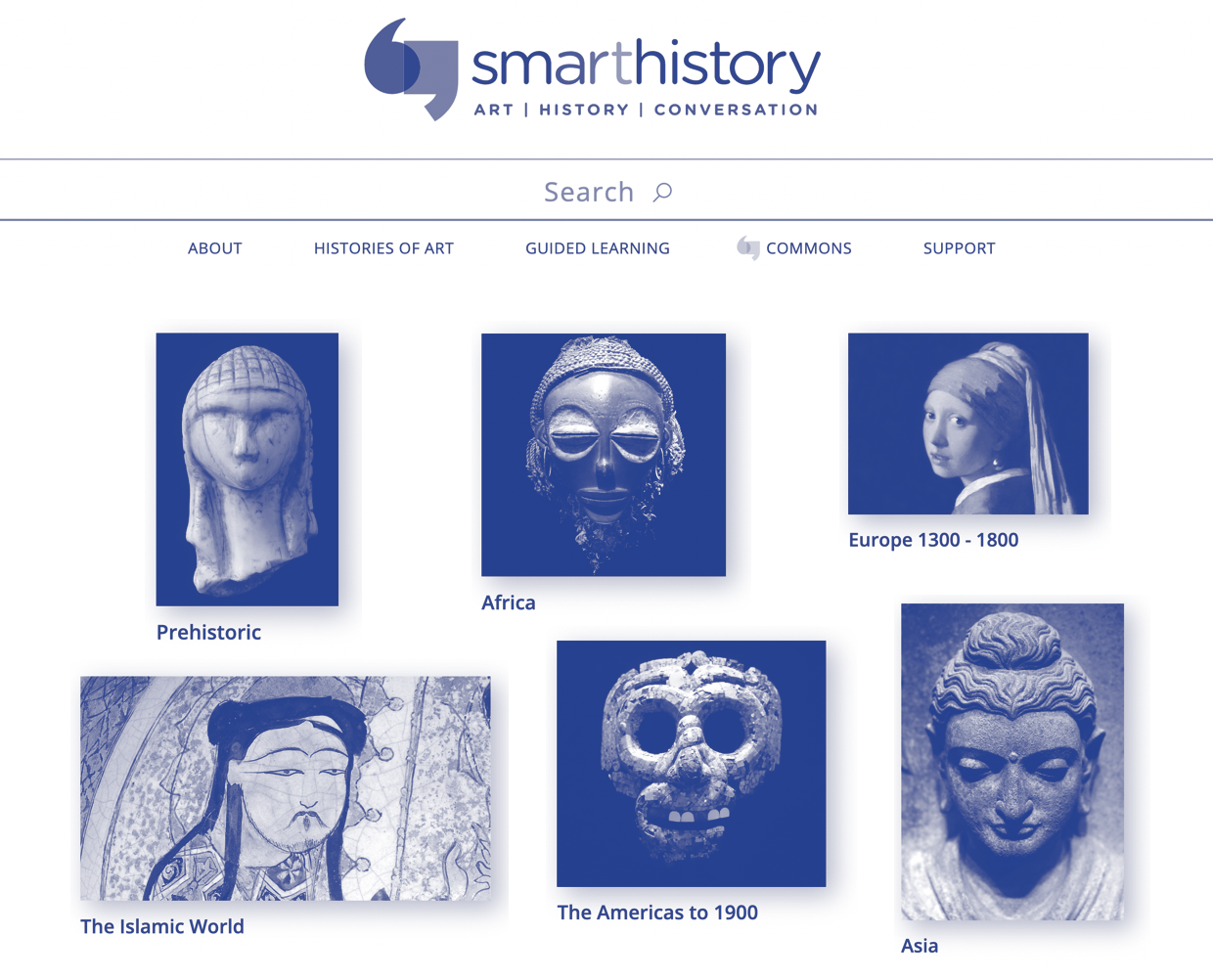
Smarthistory: Creating a Smarter, More Equitable and Diverse Art History
A workshop for scholars and students, led by our 2023 Sydney Asian Art Series Scholar in Residence Melody Rod-ari
People
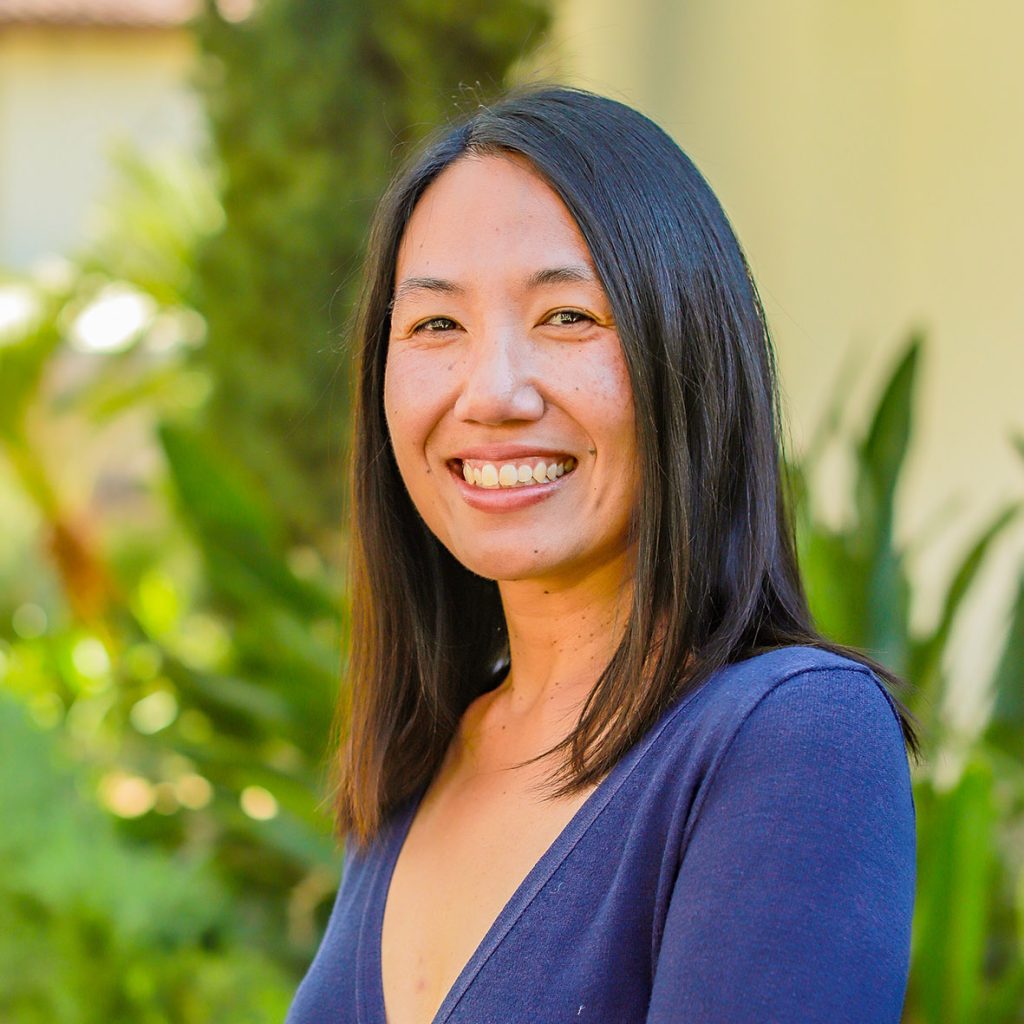
Melody Rod-ari
Melody Rod-ari is Associate Professor and Chair of Art History at Loyola Marymount University. She is also the Southeast Asian Content Editor for Smarthistory as well as an active curator who has organized exhibitions and permanent galleries for the Norton Simon Museum and the University of Southern California, Pacific Asia Museum. Her research investigates Buddhist visual culture in Thailand, and the history of collecting South and Southeast Asian art in America. Her work has been published by various journals and university presses and include topics such as “Returning ‘Home’: The Journey and Afterlife of Repatriated Objects (University of Florida Press, 2019) and “Who Owns Ban Chiang?: The Discovery, Collection and Repatriation of Ban Chiang Artefacts” (NUS Press, 2020).
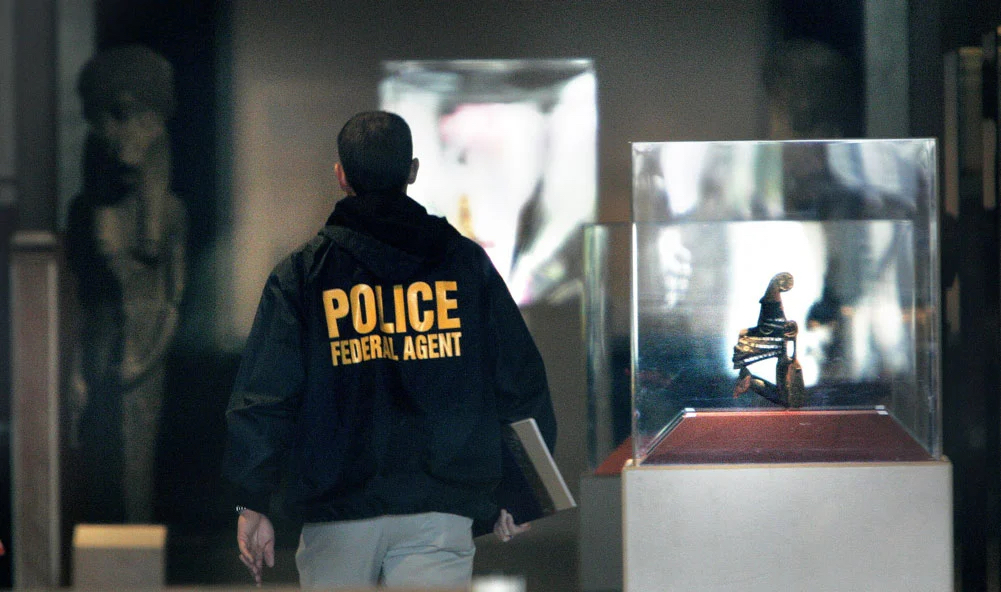
Who Owns Ban Chiang?: Revisited
Academic Melody Rod-Ari reflects on collecting histories and provenance issues in Asian art – focusing on Ban Chiang, an important archaeological site in Thailand.
People

Melody Rod-ari
Melody Rod-ari is Associate Professor and Chair of Art History at Loyola Marymount University. She is also the Southeast Asian Content Editor for Smarthistory as well as an active curator who has organized exhibitions and permanent galleries for the Norton Simon Museum and the University of Southern California, Pacific Asia Museum. Her research investigates Buddhist visual culture in Thailand, and the history of collecting South and Southeast Asian art in America. Her work has been published by various journals and university presses and include topics such as “Returning ‘Home’: The Journey and Afterlife of Repatriated Objects (University of Florida Press, 2019) and “Who Owns Ban Chiang?: The Discovery, Collection and Repatriation of Ban Chiang Artefacts” (NUS Press, 2020).
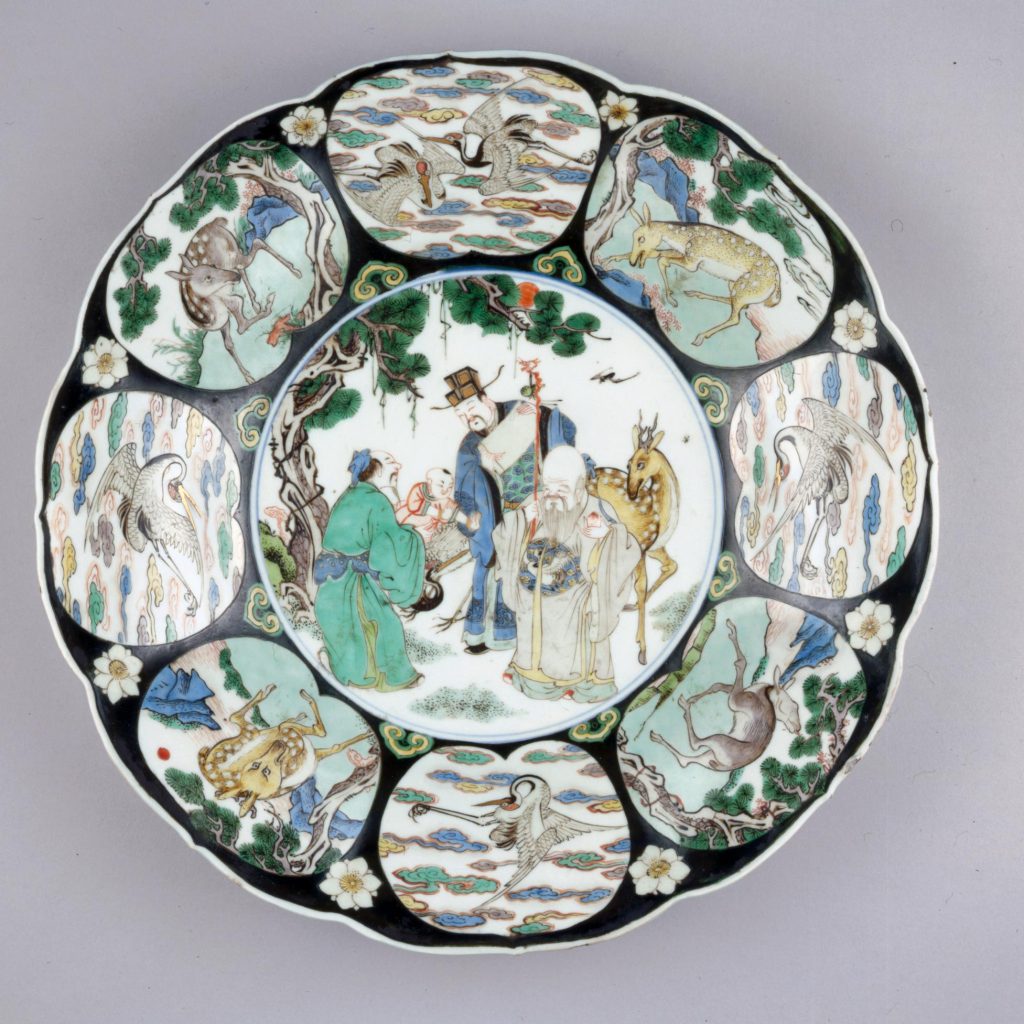
The Man Who Loved China: The Extraordinary Life and Collection of Sir Percival David
A lecture about the story behind the finest collection of Chinese ceramics outside China: the Sir Percival David Collection gallery in the British Museum in London.
People
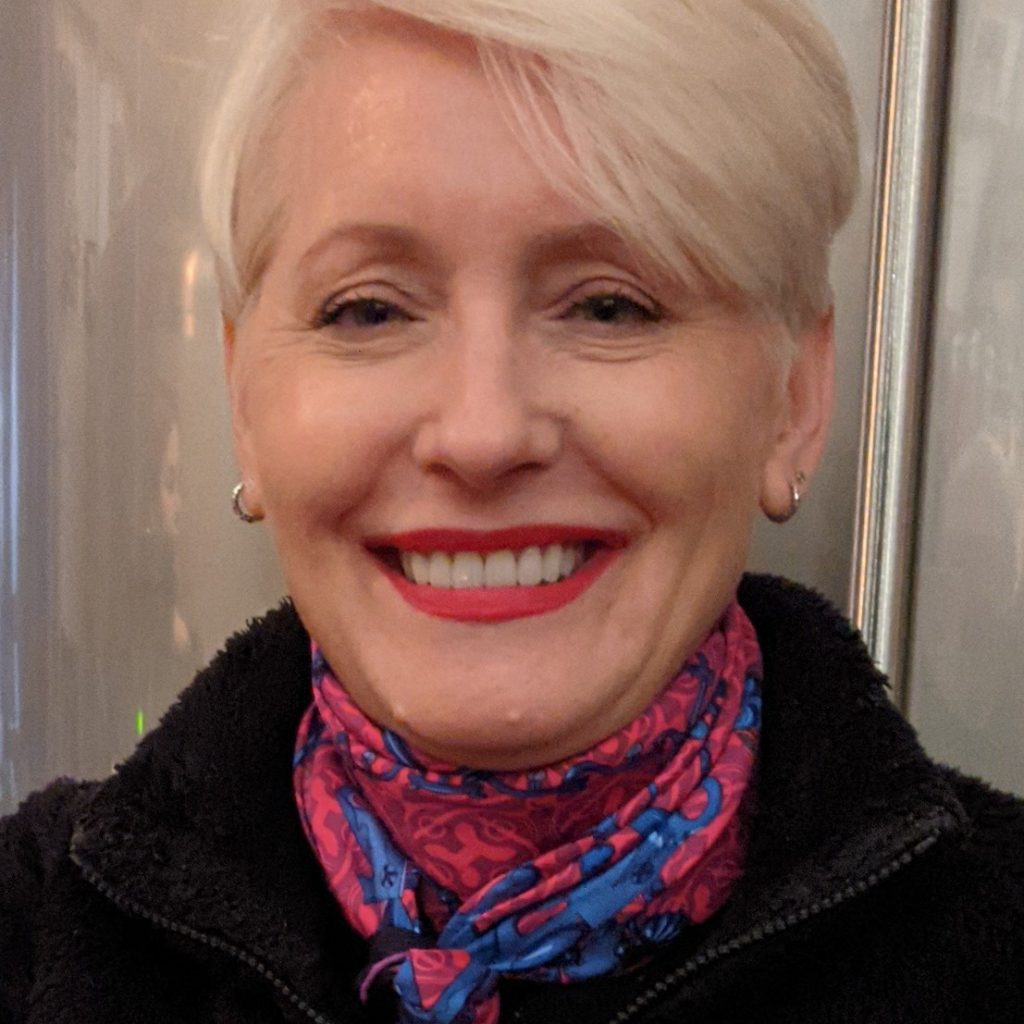
Stacey Pierson
Dr Stacey Pierson is Professor of the History of Chinese Ceramics at SOAS, University of London. In addition to teaching and supervising research students in the School of Arts, she is President of the Oriental Ceramic Society (London) and series editor for the Routledge title Histories of Material Culture and Collecting, 1550-1950. Previously, from 1995 – 2007, she was Curator of the Percival David Foundation of Chinese art, also at the University of London, which housed the world-renowned David collection of Chinese ceramics. She has published widely on aspects of Chinese ceramics and the history of collecting and exhibitions, including Collectors, Collections and Museums: the Field of Chinese Ceramics in Britain: 1560-1960 (2007), Chinese Ceramics: a Design History (2009), From Object to Concept: Global Consumption and the Transformation of Ming Porcelain (2013), Private Collecting, Exhibitions and the Shaping of Art History in London: the Burlington Fine Arts Club, 1866-1950 (2017) and the edited volume Visual, Material and Textual Cultures of Food and Drink in China, 200 BCE – 1900 CE, Colloquies on Art and Archaeology in Asia, no. 25 (2022). Her most recent research project focused on Dr Johnson’s Chinese teapot, which is on display in the British Museum.
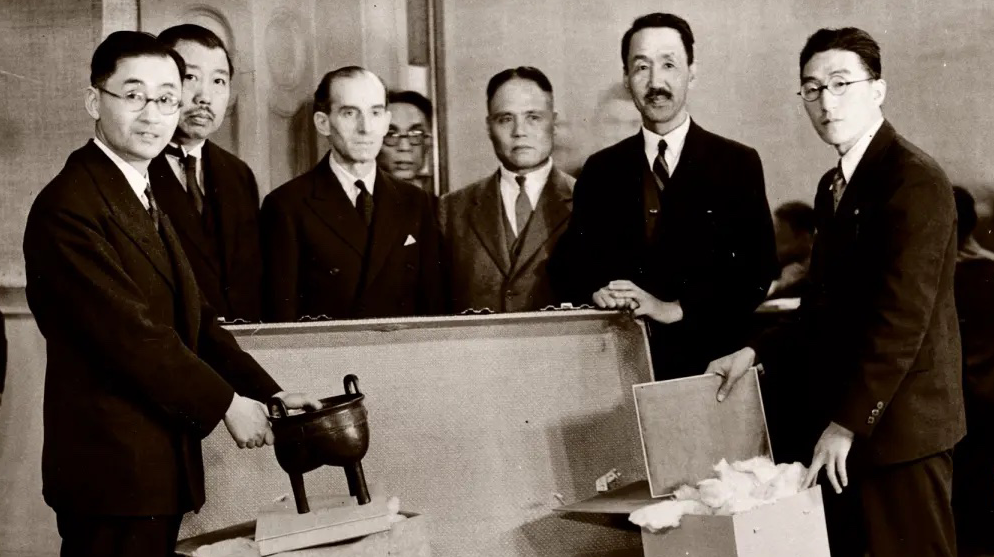
Problematising collector/collection histories: writing a critical biography
A workshop with scholar Stacey Pierson about writing a biography that is critical rather than hagiographic.
People

Stacey Pierson
Dr Stacey Pierson is Professor of the History of Chinese Ceramics at SOAS, University of London. In addition to teaching and supervising research students in the School of Arts, she is President of the Oriental Ceramic Society (London) and series editor for the Routledge title Histories of Material Culture and Collecting, 1550-1950. Previously, from 1995 – 2007, she was Curator of the Percival David Foundation of Chinese art, also at the University of London, which housed the world-renowned David collection of Chinese ceramics. She has published widely on aspects of Chinese ceramics and the history of collecting and exhibitions, including Collectors, Collections and Museums: the Field of Chinese Ceramics in Britain: 1560-1960 (2007), Chinese Ceramics: a Design History (2009), From Object to Concept: Global Consumption and the Transformation of Ming Porcelain (2013), Private Collecting, Exhibitions and the Shaping of Art History in London: the Burlington Fine Arts Club, 1866-1950 (2017) and the edited volume Visual, Material and Textual Cultures of Food and Drink in China, 200 BCE – 1900 CE, Colloquies on Art and Archaeology in Asia, no. 25 (2022). Her most recent research project focused on Dr Johnson’s Chinese teapot, which is on display in the British Museum.
People

Kavita Singh
Kavita Singh is an art historian based in New Delhi, who works on the history of Indian painting, and the history and politics of museums. Formerly Professor and Dean at the School of Arts and Aesthetics, Jawaharlal Nehru University, she has published essays on issues of colonial history, repatriation, secularism and religiosity, fraught national identities, and the memorialization of difficult histories as they relate to museums in South Asia and beyond. She has also published widely on Mughal painting, exploring style as a visual language self-consciously used by artists as a vehicle of meaning. She is the editor and author of numerous acclaimed books, including: No Touching, No Spitting, No Praying: The Museum in South Asia (co-edited with Saloni Mathur, Routledge, 2014), Museums, Heritage, Culture: Into the Conflict Zone (2015), Real Birds in Imagined Gardens: Mughal Painting Between Persia and Europe (2016), Museum Storage and Meaning: Tales from the Crypt (co-edited with Mirjam Brusius, 2017) and Scent Upon a Southern Breeze: The Synaesthetic Arts of the Deccan (2018). Singh was awarded the Infosys Prize for the Humanities in 2018 and was elected to the American Academy of Arts and Sciences in 2020.

Yael Rice
Yael Rice is associate professor of art history and Asian languages and civilizations at Amherst College, Massachusetts. She specializes in the art and architecture of South Asia, Central Asia, and Iran, with a particular focus on manuscripts and other portable arts of the fifteenth through eighteenth centuries. Between 2009-12, she held the position of Assistant Curator of Indian and Himalayan Art at the Philadelphia Museum of Art. Recent publications include “Art History Beyond Objects” (Art Journal Open, published 26 January 2023), on the importance of centering critical digital methods and tools in the teaching of collections-based art history courses; and, with Stephennie Mulder, “The Mystery of the Timurid Qur’an” (Prospect Magazine, published online July 22, 2020), on the commercial sale of Islamic manuscripts lacking any publicly-stated authenticating provenance. She is the author of the forthcoming book The Brush of Insight: Artists and Agency at the Mughal Court (University of Washington Press, 2023).

Melody Rod-ari
Melody Rod-ari is Associate Professor and Chair of Art History at Loyola Marymount University. She is also the Southeast Asian Content Editor for Smarthistory as well as an active curator who has organized exhibitions and permanent galleries for the Norton Simon Museum and the University of Southern California, Pacific Asia Museum. Her research investigates Buddhist visual culture in Thailand, and the history of collecting South and Southeast Asian art in America. Her work has been published by various journals and university presses and include topics such as “Returning ‘Home’: The Journey and Afterlife of Repatriated Objects (University of Florida Press, 2019) and “Who Owns Ban Chiang?: The Discovery, Collection and Repatriation of Ban Chiang Artefacts” (NUS Press, 2020).

Stacey Pierson
Dr Stacey Pierson is Professor of the History of Chinese Ceramics at SOAS, University of London. In addition to teaching and supervising research students in the School of Arts, she is President of the Oriental Ceramic Society (London) and series editor for the Routledge title Histories of Material Culture and Collecting, 1550-1950. Previously, from 1995 – 2007, she was Curator of the Percival David Foundation of Chinese art, also at the University of London, which housed the world-renowned David collection of Chinese ceramics. She has published widely on aspects of Chinese ceramics and the history of collecting and exhibitions, including Collectors, Collections and Museums: the Field of Chinese Ceramics in Britain: 1560-1960 (2007), Chinese Ceramics: a Design History (2009), From Object to Concept: Global Consumption and the Transformation of Ming Porcelain (2013), Private Collecting, Exhibitions and the Shaping of Art History in London: the Burlington Fine Arts Club, 1866-1950 (2017) and the edited volume Visual, Material and Textual Cultures of Food and Drink in China, 200 BCE – 1900 CE, Colloquies on Art and Archaeology in Asia, no. 25 (2022). Her most recent research project focused on Dr Johnson’s Chinese teapot, which is on display in the British Museum.

